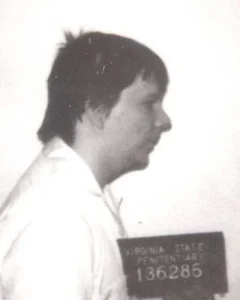Albert Clozza was executed by the State of Virginia for the murder of Patricia Beth Bolton
According to court documents Albert Clozza would abduct Patricia Beth Bolton, 13, as she was walking back to her home. The teen would be dragged into the woods where she was sexually assaulted and murdered
Albert Clozza would be arrested, convicted and sentenced to death
Albert Clozza would be executed by way of the electric chair on July 24 1991
Albert Clozza Photos

Albert Clozza Case
Albert J. Clozza, a maintenance man who raped and murdered a 13-year-old girl in Virginia Beach in 1983, was electrocuted tonight hours after saying he expected no forgiveness for his deeds.
Clozza, 31, was pronounced dead at 11:07 p.m. shortly after being administered two surges of electricity, said Jean Clarke, operations officer at the Greensville Correctional Center.
Witnesses said Clozza made no final statement in the death chamber.
He was the 12th person to die in Virginia’s electric chair since the state resumed executions in 1982 and the 150th in the nation since the 1976 U.S. Supreme Court ruling allowing states to resume capital punishment.
Clozza admitted abducting Patricia Beth Bolton while she was walking home from a bookmobile to the Virginia Beach trailer park where she lived and he worked
He said he raped her, forced her to commit sodomy and beat her to death.
In the hours before the execution, a prison psychologist and others who visited Clozza said he was “coping with his situation quite well,” Clarke said.
Clozza made no last-minute court appeals and did not request clemency from Gov. L. Douglas Wilder. Wilder said Tuesday he “completed a thorough and exhaustive review of the record” and found no reason to stop the execution.
Clozza said in a statement: “I cannot change what I have done in the past, no matter how much I wish that I could. Nothing I can say or do will stop the pain that I have caused.
“I do not expect people to forgive me for what I have done in my life. I . . . have paid for my ways.”
Clarke said ministers, Clozza’s attorneys and Marie Deans, of the Virginia Coalition on Jails and Prisons, a group that opposes the death penalty, visited Clozza today
About 60 people gathered outside the prison as the execution neared. The group included about equal numbers of death penalty opponents and curious local residents.
“I don’t think it’s fair to take a life for a life, but I guess you have to do what you have to do,” said Roger Mason, who lives down the road from the prison.
The Rev. George Ricketts, director of a private organization that provides chaplains for state prisons, said he had several reasons for opposing capital punishment, the most significant being “the possibility of executing innocent people.”
The governor’s office received 11 letters about the case, all asking for clemency for Clozza, said Michelle Prosser, Wilder’s deputy press secretary.
“The majority were from out of state and clearly associated with Amnesty International,” Prosser said. The organization opposes capital punishment, saying it violates human rights
Wilder received hundreds of letters and phone calls in February asking that he spare the life of double-murderer Joseph A. Giarratano because he might be innocent. The governor commuted the sentence to life in prison.
Virginia’s electric chair was last used in December, before it was moved from the State Penitentiary in Richmond to the Greensville prison in Jarratt, 55 miles south.
The chair was put into use in 1908 and had been used to execute 246 men and one woman before yesterday.







